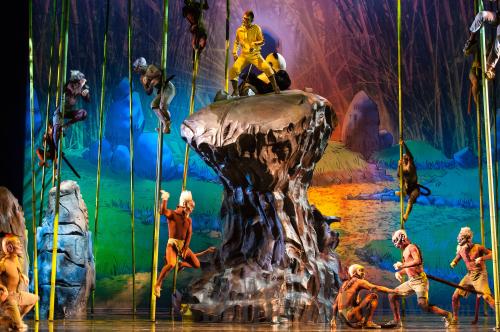|
 |
|
WONDERLAND: Monkey King and his fellow monkeys have fun at their homeland—Monkey Park (STEPHANIE BERGER) |
Do not annoy Buddha, even if you're a cloud-jumping monkey super fighter who just stole the peaches of heaven.
Life had been looking up for the Monkey King. After hatching from a stone egg and going on a quest to gain immortality he had defeated every obstacle and made it to the garden of heaven. There, an exasperated Buddha imprisoned him under his palm—a giant, purple, hydraulic-powered hand that emerged from the curtains of Lincoln Center's David H. Koch Theater.
Monkey: Journey to the West (Monkey) made its New York debut on July 9 to open this year's Lincoln Center Festival. The 110-minute spectacle of acrobatics, animation, kungfu and an eclectic, genre-bending score follows the journey of Chinese folk hero—the Monkey King—to India along with the monk Tripitaka, a pig-man, a taciturn green swordfighter and a horse. The Monkey King is a well-known and beloved character in China but this futuristic take on the classic story is a different entity entirely.
The show made its first appearance at the Manchester International Festival in England in 2007. It then showed in Paris and at the Spoleto Festival USA and the Royal Opera House in London. Bringing it to New York City feels like "coming home," said writer and director Chen Shi-Zheng.
"I have always wanted to bring it to New York," Chen said. "Taking it home is like a dream come true."
Chen has had a long relationship with the Lincoln Center Festival, beginning with an epic staging of Peony Pavilion in 1999, followed by The Night Banquet in 2002, The Orphan of Zhao in 2003 and My Life as a Fairytale in 2005.
"I've been very eager to bring [Monkey] to the festival since seeing it in Manchester," said Nigel Redden, Director of the Lincoln Center Festival. "It's great for China newbies. The story is unfamiliar to most Americans but is a drama that all of us can enjoy and it captures the imagination."
Taking Chinese classics and making them accessible for Western audiences is a hallmark of Chen, Redden said.
The future past
For Monkey, Chen collaborated with Damon Albarn, from British band Blur, and artist Jamie Hewlett. Albarn and Hewlett are the creators of the virtual band Gorillaz and its signature fusion of hip-hop, pop, electronica and rock. Hewlett's manga-inspired animations and characters are used to great effect in Monkey with a dancing purple octopus and crustacean-adorned, pink plate spinners floating around the stage. The Monkey King himself is wearing a Bruce Lee-striped tracksuit and gold sneakers as he takes on the evil white skeleton demon, the Spider Woman, and the devious Princess Iron Fan. Transitions between scenes are done with animated movies that blend seamlessly into the live action.
British-born Hewlett draws much of his inspiration for Monkey from the 1978 Japanese television adaptation Saiyuki, which the BBC broadcast for audiences in England.
"It would appear that Americans don't know about this story," Hewlett told Beijing Review. "For us (British), we knew about the Japanese TV show and it was the best thing to watch when you were 10 years old. It's an amazing story, the characters are incredible, it's something we can all relate to and understand."
The blend of animated storytelling, dance, and over-the-top stage design engages foreign audiences unfamiliar with the classic Chinese story, said Hewlett. Journey to the West was originally a 16th century novel by Wu Cheng'en and has had many stage and film adaptations.
"The show is all in Mandarin, but it doesn't matter because you don't need to understand what is being said. You can see it," Hewlett said.
It's the type of classic adventure story that delights audiences and the modern approach will surely draw in a new type of crowd to the Lincoln Center Festival.
"I took nine chapters from the novel that can be understood without too much dialogue, in order to reach a broad audience in the West," Chen said.
When creating the musical, Chen invited his collaborators on a trip to the Chinese countryside, where they took photographs and field recordings of folk musicians to form the foundations of the musical direction. The opera is sung in Mandarin (with English subtitles), and the cast was cultivated in Beijing. The acrobats are from the Jiangsu Yancheng Acrobatic Co.
"As a Peking Opera actor, I used to play the role of Monkey King in several plays. But this time it's quite different. It's really a fun to cooperate with director Chen, who left us lots of creative spaces and encouraged us to perform as we understand," said Wang Lu, who performs the role of Monkey King.
| 